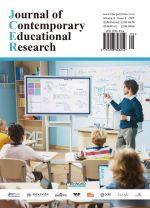Research on the Leadership of Educators’ Spirit in the Ideological and Political Teaching of Advanced Mathematics Courses under the Strategy of Building an Educational Powerhouse
Abstract
Under the strategy of building an educational power country, the reform of higher mathematics teaching should take into account both value guidance and digital innovation. This study, guided by the “educationalist spirit”, explores the integration of course ideological education into teaching and leverages digital innovation for empowerment. Analyzing the literature reveals that there is a gap in the connection between the “educationalist spirit” theory and the “digital and intelligent technology” practice. Therefore, a “spiritual guidance–technological empowerment” dual-wheel driving model is proposed, along with the corresponding framework and path. Research shows that this model can enhance teaching effectiveness and educational quality, providing an integrated path for cultivating top-notch innovative talents.
References
Wang S, Yu S, 2025, Innovation and Practice of Course Ideological and Political Education in Basic Mathematics Courses. Higher Education Journal, 11(19): 54–58.
Wang C, Zhao G, 2025, The Three Dimensions of Integrating the Spirit of Educators into Ideological and Political Education in Higher Education Institutions. Higher Education Research of Heilongjiang, 43(06): 1–6.
Chen M, Scott S, Stevens J, 2017, Technology as a Tool in Teaching Quantitative Biology at the Secondary and Undergraduate Levels: A Review. Letters in Biomathematics, 5(1): 30.
Betts K, Reddy P, Galoyan T, et al., 2023, An Examination of the Effects of Virtual Reality Training on Spatial Visualization and Transfer of Learning. Brain Sciences, 13(6): 890.
Lepore M, 2024, A Holistic Framework to Model Student’s Cognitive Process in Mathematics Education Through Fuzzy Cognitive Maps. Heliyon, 10(16): e35863.
Wang X, Duan M, Su P, et al., 2025, Deep-Learning-Enabled Multi-Omics Analyses for Prediction of Future Metastasis in Cancer. BioRxiv.
Mukuka A, 2024, Data on Mathematics Teacher Educators’ Proficiency and Willingness to Use Technology: A Structural Equation Modelling Analysis. Data in Brief, 54: 110307.
Shernoff D, Sinha S, Bressler D, et al., 2017, Assessing Teacher Education and Professional Development Needs for the Implementation of Integrated Approaches to STEM Education. International Journal of STEM Education, 4(1): 13.
Huang W, 2025, Case Teaching Design and Strategies of College Mathematics Course Incorporating Ideological and Political Elements. Journal of Normal Science of Higher Education, 45(02): 73–77.
Li L, Wang H, Zhong C, 2024, Exploration and Practice of Integrating Ideological and Political Education into University Mathematics Courses: Taking the National-Level “Golden Course” Advanced Mathematics Course as an Example. University, 2024(24): 120–123.
Li W, 2025, Strategies for Enhancing the Quality of Ideological and Political Education in Curriculum Through the Spirit of Educators. Journal of Wuyi University (Social Sciences Edition), 27(02): 77–81 + 94.

